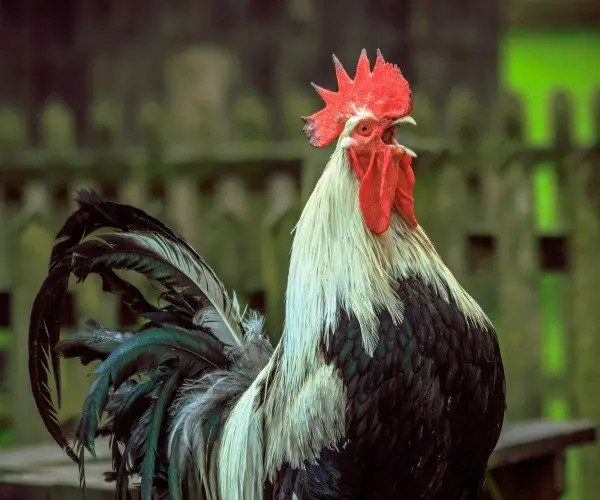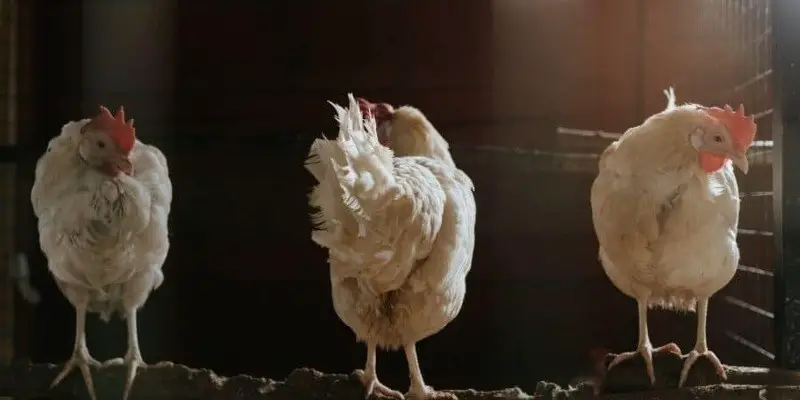Last Updated on March 1, 2024 by Pauline G. Carter
No, Chickens are not blind at night, but their night vision is poor as they have very few rods in their eyes, which are responsible for seeing in low-light conditions. Rods help with night vision, while cones help with seeing colors during the day.
As chickens have fewer rods compared to humans, their ability to see in the dark is limited. This is because chickens evolved from dinosaurs and never spent millions of years as nocturnal animals, which is why their night vision is not as developed as some other species.
Chicken Behavior At Night
Chickens have poor night vision due to their low light sensitivity, as their eyes contain fewer rods than humans. This means they struggle to see in the dark and often rely on their instinct to find a safe roosting spot.
Unlike some nocturnal animals, chickens are not naturally adapted to the dark and can become disoriented in low light.
Roosting Instincts
Chickens have an instinct to roost at night. This behavior is performed every day at dusk as they look for a secure and high place to sleep. By finding a safe roosting spot, chickens can protect themselves from potential predators, ensuring a peaceful night’s rest.
Precautions For Nighttime
Chicken owners need to provide roosting bars in the coop, which offer perching space above the floor. This helps create a comfortable and secure environment for chickens to spend the night. Not only does this prevent them from sleeping in nesting boxes, but it also reduces the risk of predators reaching them while they rest.
Although chickens have poor night vision compared to humans, they can sense whether it is light or dark through the pineal gland located behind their eyes. Their low light sensitivity, caused by having fewer rods in their eyes, makes them effectively night-blind. Therefore, it is crucial to ensure their coop is well-lit during the night to help them navigate and find their way back to safety.
Night Vision in Chickens
While it’s not accurate to say chickens are blind at night, their vision is indeed severely limited compared to their daytime capabilities. As the light levels drop, chickens’ ability to discern details, recognize shapes, and perceive their surroundings decreases. This diminished vision at night explains why chickens prefer to roost as darkness falls. Roosting in a safe, elevated place allows them to avoid potential threats that they cannot see or escape from due to their limited night vision.
Chickens’ reliance on light to see means that as dusk turns to darkness, they become more vulnerable to predators. This vulnerability is a critical reason why chickens instinctively seek safety and will often head to their coop or a familiar roosting spot as the light fades. Once settled in for the night, they are less likely to venture out until daylight returns.
Implications for Chicken Care
Understanding chickens’ limited vision at night has practical implications for their care. Ensuring that coops are secure and providing a safe roosting environment is paramount for protecting chickens from nocturnal predators. Additionally, it’s advisable to avoid disturbing chickens after dark. Since they cannot see well, being startled at night can cause stress or injury as they might panic and flap around, unable to see where they are going.
For poultry keepers, managing light in the coop can also play a significant role in the well-being of their flock. Artificial lighting can extend the perceived daylight hours for chickens, influencing their laying cycles and activity levels. However, it’s essential to provide a natural dark period to allow chickens to rest and maintain their natural behaviors. Sudden changes in lighting can be disorienting and stressful, so any artificial lighting should be introduced gradually and mimic a natural sunrise and sunset as closely as possible.
Chickens’ Vision Development
Chickens evolved after the dinosaur age and didn’t spend millions of years as nocturnal animals like many other species. Their night vision is poor due to their low light sensitivity never having developed in the retina. Their eyes have fewer rods than ours.
Retina Sensitivity
Like humans, chicken eyes contain photoreceptors called rods and cones. Rods help to see at night, and cones see colors during the day. Chickens have very few rods, meaning their night vision is poor (worse than humans).
Practical Considerations
When managing chickens at night, it’s essential to understand their limited night vision. This impacts how you provide lighting and structure your coop. Let’s dive into the practical considerations of managing and lighting for chickens after dusk.
Managing Chickens At Night
Chickens naturally seek a secure, high place to roost at dusk for safety while sleeping. It’s crucial to provide appropriate roosting bars in the coop to fulfill this instinctual behavior. To keep chickens from sleeping in nesting boxes, proper roosting area design is essential.
Lighting For Chickens
Understanding chickens’ poor night vision due to their low light sensitivity is crucial when considering lighting for their coop. While they may not see well in the dark, providing adequate lighting near their roosting area can help guide them back to the coop at night.
The limited rods in their eyes affect their perception of darkness, so it’s important to maintain a consistent lighting schedule to facilitate their movement after dusk.
Can Chickens Stay Outside At Night?
The answer is yes; chickens can stay outside at night as long as the temperature is above freezing. They will huddle together to stay warm and will fluff out their feathers to trap heat. If the temperature dips below freezing, however, you will need to bring your chickens inside or provide some heat source for them. A heat lamp is a standard solution, but make sure to monitor it closely to avoid any fires.
In general, chickens do best in temperatures between 50 and 70 degrees Fahrenheit. So, as long as it’s not too hot or too cold, they should be fine staying outside at night.
Should Chickens Be Shut In At Night?
Most chicken owners choose to shut their chickens in at night. There are many reasons for this, including protection from predators and bad weather. Chickens are also less likely to wander off and get lost if they’re shut in.
Shutting chickens in at night is generally straightforward. You can build a simple chicken coop or enclosure or even use an existing shed or outbuilding. The important thing is to make sure the space is secure so that predators can’t get in and your chickens can’t get out.
Once your chickens are shut in at night, you’ll need to provide them with food and water. Chicken feeders and waterers can be purchased at most farm supply stores. You’ll also need to make sure the coop or enclosure is well-ventilated to prevent your chickens from suffocating.
Overall, shutting chickens in at night is an excellent way to protect them from predators and bad weather.
FAQs
Do chickens have bad eyesight at night?
Yes, chickens have poor night vision due to their lack of rod cells, which are essential for seeing in low light. Their eyes are adapted for daylight, allowing them to see colors vividly but leaving them with significantly reduced vision as darkness falls, making them almost unable to see at night.
What happens to chickens at night?
At night, chickens instinctively seek safety and roost in a secure spot, typically elevated off the ground. Their limited night vision makes them vulnerable to predators, so they prefer to stay in familiar, safe places until daylight returns. They spend the night resting and conserving energy for the next day.
Do chickens close their eyes at night?
Yes, chickens do close their eyes at night to sleep. Like most birds, they need rest to recover from the day’s activities. Closing their eyes helps them achieve a state of restful sleep, ensuring they are well-rested for the next day. Roosting in a safe place allows them to sleep more soundly.
Can chickens see anything in the dark?
Chickens can see very little in the dark due to their limited night vision. They lack the necessary rod cells in their eyes that many nocturnal animals have for seeing in low-light conditions. This makes their ability to navigate or recognize shapes and movements at night extremely poor.
Can baby chickens see in the dark?

Like adult chickens, baby chickens (chicks) also have poor night vision and cannot see in the dark. Their eyes are not equipped with enough rod cells for night vision, making them dependent on ambient light to see. This is why it’s important to keep chicks in a well-secured, comfortable environment with appropriate lighting.
Can Roosters See At Night?

No, roosters cannot see at night. They have poor vision in low light and are unable to visit in the dark. This is because their eyes are not adapted to night vision. However, they can still see during the day and have good color vision.
Conclusion
No, Chickens are not blind at night, but they do have poor vision in low-light conditions. Chickens have a tapetum lucidum, a reflective layer behind the retina that helps them see in low light. However, this layer only works well in very dark conditions. Chickens also have relatively small eyes, which limits their ability to see in low light.


